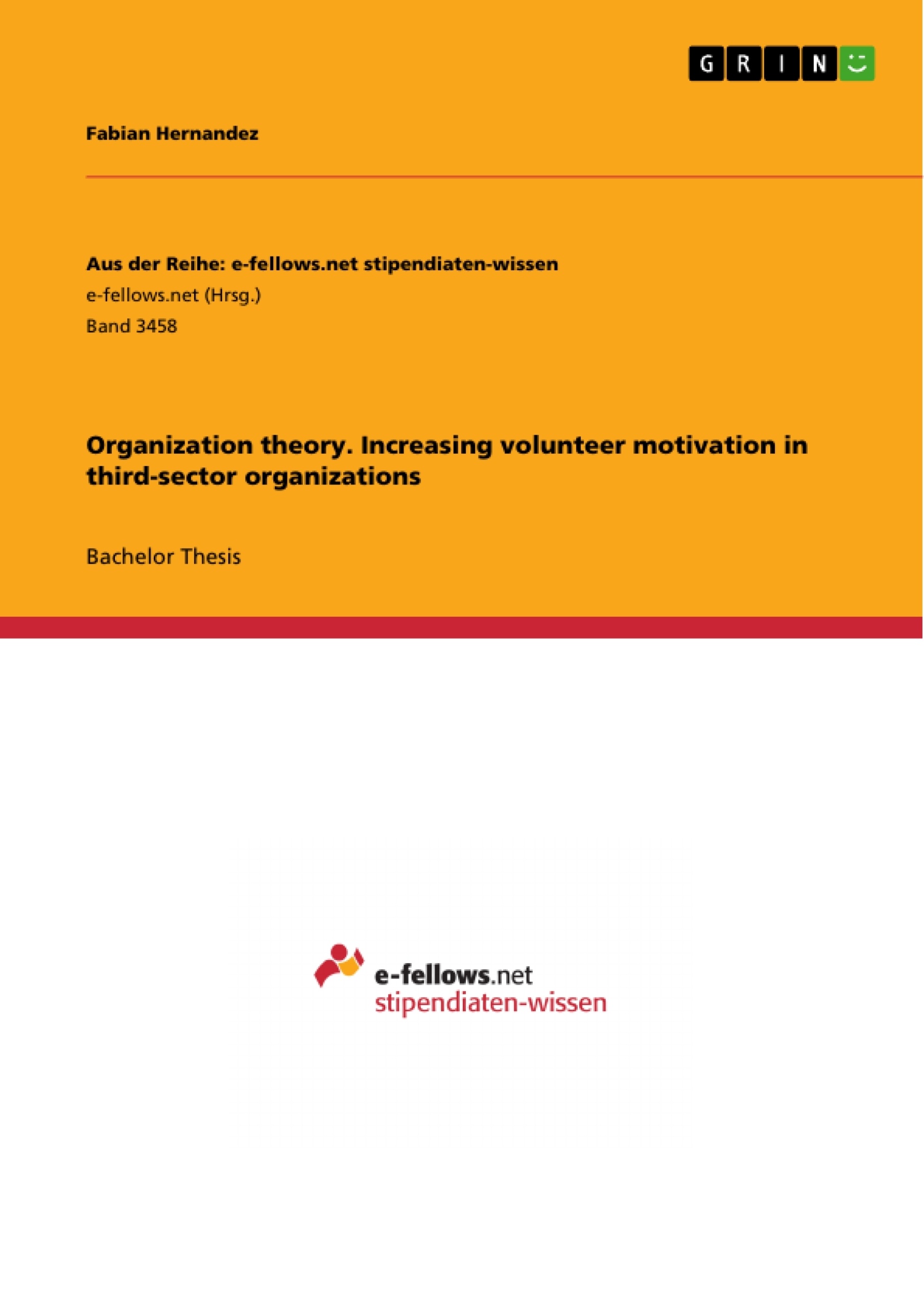How can one categorize organizations like the Gutenberg Digital Hub (GDH)? What can help those organizations to motivate their volunteers? This thesis presents insights into the current state of organization theory and how specific, new forms of organizations in Germany can be classified with it.
Thereafter, it links this classification to motivation theory and shows the connection from Vroom’s expectancy theory to the field of volunteer motivation. Furthermore, this thesis wants to empower GDH-like organizations to grasp which methods or techniques can be applied in real world situations. Therefore, a dual approach combines a literature review and a case study. These two offer more detailed hints to increase volunteer motivation in such organizations. For instance, promising options are addressing needs of the potential volunteers, enabling autonomy or demonstrating the motive of the organization. An understanding of volunteer motivation in general and advice for recruiting processes are displayed as well. This thesis delivers a classification of this unique type of organization and an overview of motivation theory in the volunteer context, thereby providing both academic and practical value.
Inhaltsverzeichnis (Table of Contents)
- Introduction
- Course of the thesis
- Motivation theory
- Influence of organisation theory
- Non-profit sector and motivation theory
- Vroom's Expectancy Theory
- Methodical procedure
- Literature review
- Case Study
- Applied method and adaptions
- Selection of Digital Hubs and associations
- Structure of the questionnaire
- Analysis
- How to increase volunteer motivation
- Findings of the research
- Findings of the case study
- Discussion and limitations
- Conclusion and future steps
Zielsetzung und Themenschwerpunkte (Objectives and Key Themes)
This thesis examines the challenge of motivating volunteers in third-sector organizations, specifically using the Gutenberg Digital Hub (GDH) as a case study. It aims to categorize the GDH within existing organizational theory frameworks and explore how motivation theory, particularly Vroom's Expectancy Theory, can be applied to this unique hybrid organization. The study seeks to empower similar organizations by providing practical insights and methods for increasing volunteer motivation.
- Classification of the Gutenberg Digital Hub as a hybrid organization within organizational theory.
- Application of Vroom's Expectancy Theory to understand volunteer motivation in the context of the GDH.
- Exploration of practical methods and techniques for increasing volunteer motivation in similar organizations.
- Identification of key factors influencing volunteer motivation, such as addressing needs, enabling autonomy, and demonstrating organizational purpose.
- Analysis of the unique characteristics of the GDH and its impact on volunteer motivation.
Zusammenfassung der Kapitel (Chapter Summaries)
- Introduction: This chapter introduces the thesis and outlines its course, focusing on the importance of volunteer motivation in third-sector organizations and specifically the GDH.
- Motivation theory: This chapter explores the theoretical framework for understanding motivation in organizations, including the classification of the GDH as a hybrid organization and the application of Vroom's Expectancy Theory.
- Methodical procedure: This chapter details the research methodology used in the thesis, including the literature review and case study approach, outlining the specific methods employed and adaptations made for the GDH.
- How to increase volunteer motivation: This chapter presents the findings of the research and case study, highlighting key insights into increasing volunteer motivation in the GDH and similar organizations.
- Discussion and limitations: This chapter analyzes the findings, highlighting the limitations of the research and suggesting areas for future research.
Schlüsselwörter (Keywords)
This thesis focuses on key concepts such as volunteer motivation, third-sector organizations, hybrid organizations, Vroom's Expectancy Theory, digital transformation, and the Gutenberg Digital Hub. The research examines how these concepts intersect and contribute to a better understanding of how to effectively motivate volunteers in this unique organizational context.
Frequently Asked Questions
What is the Gutenberg Digital Hub (GDH)?
The GDH is a hybrid organization in Germany that supports digital transformation. This thesis uses it as a case study to analyze volunteer motivation in the non-profit sector.
How can Vroom’s expectancy theory be applied to volunteers?
Vroom’s theory suggests that motivation depends on the expectation that effort leads to a result, and that this result has a specific value (valence) for the volunteer.
What are the best ways to increase volunteer motivation?
Promising strategies include addressing the personal needs of volunteers, granting them autonomy in their tasks, and clearly demonstrating the organization's social purpose.
What is a hybrid organization in organization theory?
Hybrid organizations combine elements from different sectors, such as private business goals and non-profit social missions, creating unique management challenges.
How should recruiting processes for volunteers be designed?
Recruiting should be transparent about the motives of the organization and focus on how the volunteer's contribution aligns with their own interests and developmental goals.
- Citar trabajo
- Fabian Hernandez (Autor), 2019, Organization theory. Increasing volunteer motivation in third-sector organizations, Múnich, GRIN Verlag, https://www.grin.com/document/899636



